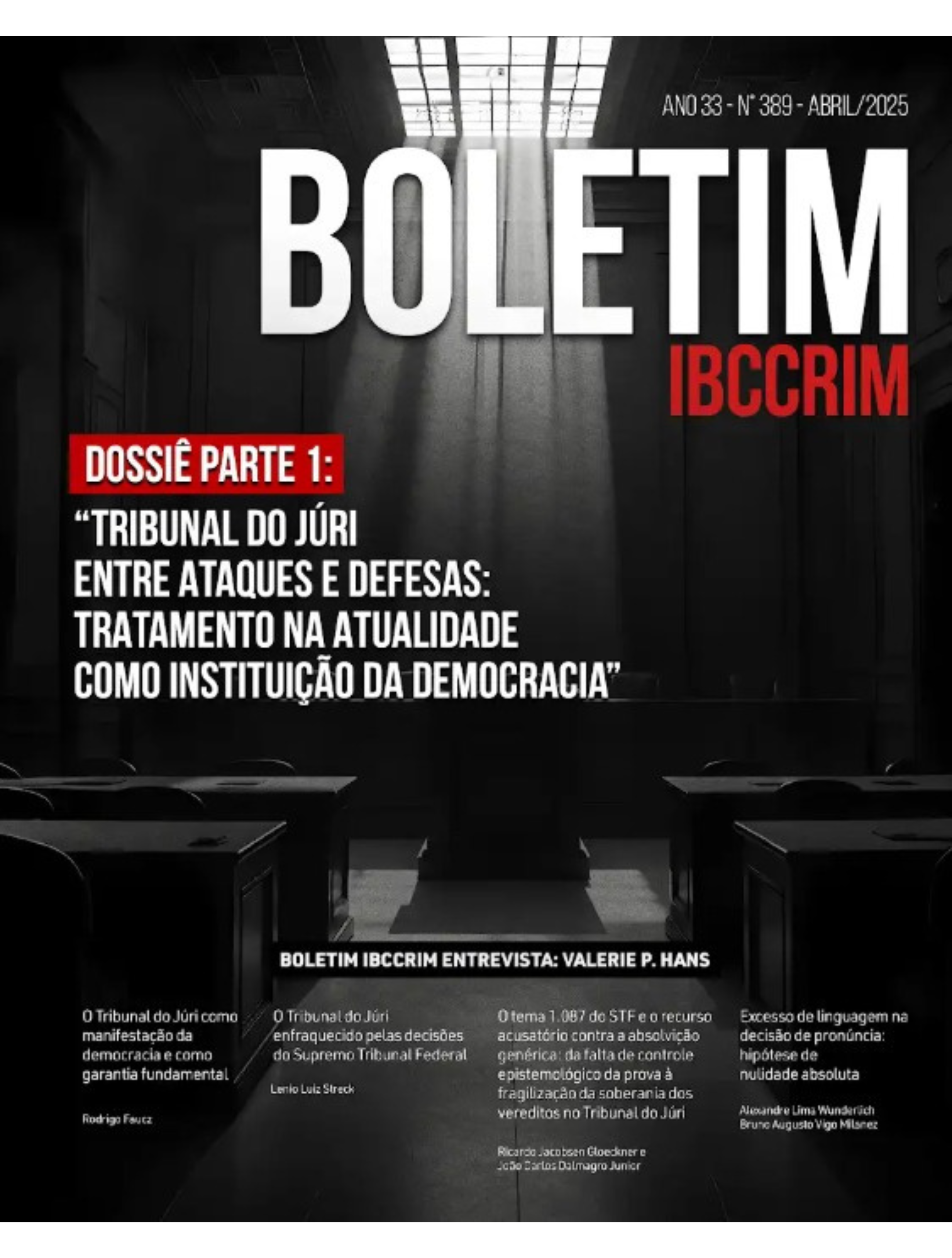Theme 1,087 of the Supreme Court and the accusatory appeal against generic acquittal:
from the lack of epistemological control of the evidence to the weakening of the sovereignty of verdicts in the Jury Trial
Views: 161DOI:
https://doi.org/10.5281/zenodo.15045726Keywords:
Jury Trial, Accusatory Appeal, Theme 1.087, Sovereignty of VerdictsAbstract
The article discusses the repercussions and scope of the accusatory appeal against acquittal on the grounds of generic acquittal in the jury trial, based on the decision of the Federal Supreme Court (STF) which, by establishing the thesis of Theme 1087, recognized the possibility of handling such an appeal based on the existence of a decision manifestly contrary to the evidence in the case file. The essay covers the historical-legislative path that, strictly speaking, has always engendered modifications deflated by a certain distrust of the institute, as well as the interpretations promoted contemporaneously by the STF towards the degeneration of the jury trial into an anti-guarantee. This itinerary includes the lack of epistemological control of the evidence that forms the jury’s conviction and the misrepresentation of the sovereignty of verdicts, today a slogan that disregards the appellate system inherent to the jury and disconnects from the notion of the presumption of innocence.
Downloads
Publication Facts
Reviewer profiles N/A
Author statements
- Academic society
- Instituto Brasileiro de Ciências Criminais
- Publisher
- IBCCRIM
References
BRASIL. Supremo Tribunal Federal. Recurso Extraordinário 1.486.671/RS. Recorrentes/recorridos: Ministério Público Federal e outros. Relator: Ministro Dias Toffoli. Decisão monocrática: 2 set 2024, DJE: 3 set 2024.
CATALANO, Elena Maria. Giurisprudenza creativa nel processo penale italiano e nella common law: abnormità, inesistenza e plain error rule. Rivista Italiana di Diritto e Procedura Penale, anno 38, fasc. 1, p. 299-321, 1996.
CRUZ, Rogerio Schietti Machado. A proibição da dupla persecução penal. Rio de Janeiro: Lumen Juris, 2008.
DAMASKA, Mirjan. Evidence law adrift. New Haven: London: Yale University Press, 1997.
LAFAVE, Wayne R; ISRAEL, Jerold H. Criminal procedure. 2 ed. Saint Paul: West Publishing, 1992.
NOBILI, Massimo. Il principio del libero convincimento del giudice. Milano: Giuffrè, 1974.
VÁZQUEZ ROJAS, Carmen. De la prueba científica e la prueba pericial. Madrid: Marcial Pons, 2015.
Downloads
Published
How to Cite
Issue
Section
License
Copyright (c) 2025 Prof. Me. João Carlos Dalmagro Junior, Prof. Dr. Ricardo Jacobsen Gloeckner

This work is licensed under a Creative Commons Attribution-NonCommercial 4.0 International License.
Copyright of published articles belongs to the author, but with journal rights over the first publication and respecting the one-year exclusivity period. Authors may only use the same results in other publications by clearly indicating this journal as the medium of the original publication. If there is no such indication, it will be considered a situation of self-plagiarism.
Therefore, the reproduction, total or partial, of the articles published here is subject to the express mention of the origin of its publication in this journal, citing the volume and number of this publication. For legal purposes, the source of the original publication must be consigned, in addition to the DOI link for cross-reference (if any).


 Português (Brasil)
Português (Brasil)
 English
English
 Español (España)
Español (España)







